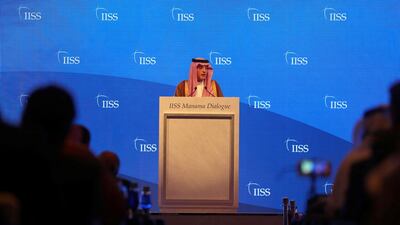The primary actor for instability in the Middle East over the past 50 years has been Iran and the behaviour and actions of the Iranian state ever since, Saudi Foreign Minister Adel Al Jubeir said on Saturday as he opened his speech at the Manama Dialogue in Bahrain.
Speaking at the security forum, the Saudi foreign minister opened by painting a bleak modern history of the region pointing to conflicts and war in the past five decades that led to the rise of terror groups and civil conflict.
“The only difference is that the conflicts today are driven by regional actors bent on changing the regional order rather than outside powers trying to dominate the Middle East," Mr Al Jubeir said.
This has led to the Middle East facing two competing visions: one of light and one of darkness. “One is what we stand for in Saudi Arabia and the Gulf countries and the other is what Iran stands for,” he said.
Against a dark future that seeks to spread sectarianism, encourage terrorism and seeks to dominate and destabilise other countries, he said that there is an alternative.
“There’s a focus on economic growth and diversification, there’s a focus on innovation, technology, efficiency. There’s a focus on youth and empowering women, there’s a focus on creating transparent accountable efficient governments that can provide a better future for our citizens,” he said.
“So we are going through a challenging period in the Middle East but it is not more challenging than what we went through 30, 40 or 50 years ago,” he said.
“The challenges we face are surmountable and we will - with wise leadership, perseverance and a pragmatic proportional and rational approach - overcome them as we have overcome past problems.”
______________
More from the Manama Dialogue:
US stands against Iran's proliferation of weapons and funding of 'proxy terrorists'
King Abdullah says "full funds" must go to Palestinian aid agency
______________
Mr Al Jubeir said he has no concern about the future of the region as “light always triumphs over darkness,” and therefore he said he believes the Middle East “will end up in a better place, a more prosperous, more peaceful place.”
While he expressed confidence that the challenges would be overcome, he ended his address with the poignant question of how “how do we deal with the forces of darkness, how do we push back against them and how do we persuade them to evolve into something else or how do we defeat them.”
During the question and answer section of the talk, Mr Al Jubeir was asked about changing relationships in the region and the wider world with relation to Israel and the US. The Saudi foreign minister said that his country still saw the principles of the Beirut conference in 2002 that calls for Israel to withdraw from occupied Palestinian territory and allow a Palestinian state within 1967 borders with East Jerusalem as the capital as the pre-requisite in order for peace and normalized ties.
In regard to the US, he said that the relationship was ironclad and had enjoyed many successes even if it had also suffered some knocks over the years. "The 1970s oil embargo … and 9/11 was a shock to the relationship but we always go back, roll up our sleeves, works at it and make sure the relationship comes out stronger than before”, he said.

